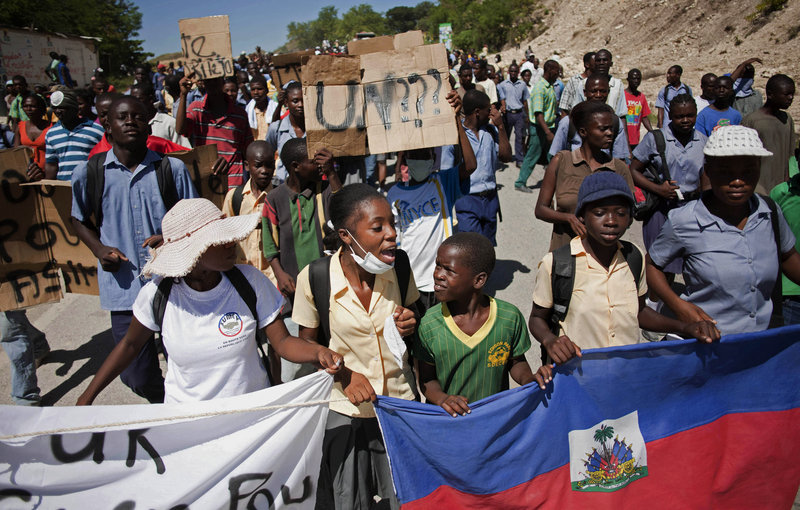PORT-AU-PRINCE, Haiti – Hundreds of protesters who blame U.N. peacekeepers from Nepal for Haiti’s widening cholera epidemic marched on a rural military base Friday to demand the soldiers leave the country.
Demonstrators waving tree branches and carrying anti-U.N. banners walked from the central plateau city of Mirebalais several miles to the gates of the base perched above a tributary of the Artibonite River — a waterway identified by health officials as a conduit for the infection.
The protesters chanted “Like it or not, they must go” as the Nepalese soldiers and other U.N. peacekeepers remained inside.
Cholera has sparked widespread fear in Haiti, where it was unknown before the outbreak was first noticed by authorities Oct. 20. As of Friday morning, more than 4,700 people had been hospitalized and at least 330 had died, according to the U.N. Office for the Coordination of Humanitarian Affairs.
There has been no scientific conclusion on the origin of the epidemic, which became evident when dozens of patients began dying with high fevers and watery diarrhea at a hospital in the town of St. Marc a few miles from the last stretch of the river.
Experts say the disease was likely imported. Until this month, there had not been a diagnosed case of cholera in Haiti as far back as records go in the mid-20th century, said Claire-Lise Chaignat, head of the global task force on cholera control at the World Health Organization.
Speculation among Haitians is increasingly centered on the Nepalese peacekeeping base near Mirebalais, much of it being stoked by politicians including the town’s mayor ahead of the Nov. 28 national elections.
Cholera is endemic in Nepal and the country suffered outbreaks this summer. The current troop contingent arrived in shifts starting Oct. 9, after the outbreak in their home country and shortly before the disease broke out in Haiti. Cases have been concentrated downriver along the Artibonite.
The U.N. mission in Haiti responded to the rumors with a statement Tuesday saying that sanitation around the base was in line with the standards set by the U.S. Environmental Protection Agency and the United Nations.
But when Associated Press journalists visited Wednesday, they found open and cracked pipes behind the base, with U.N. military investigators taking samples. There was an overpowering smell of human waste, and a pipe leading toward a septic tank was leaking foul-smelling black fluid toward the river.
The waste is dumped across the street in open pits that residents said often overflow into the Artibonite tributary running below. The contractor, Sanco Enterprises SA, says the pits are sprayed with bleach.
The U.N. mission says no cases of cholera have been found among the Nepalese soldiers, but it is not clear if, how or when testing was carried out. The U.S. Centers for Disease Control and Prevention says people are often infected with the disease without showing symptoms.
Send questions/comments to the editors.



Comments are no longer available on this story